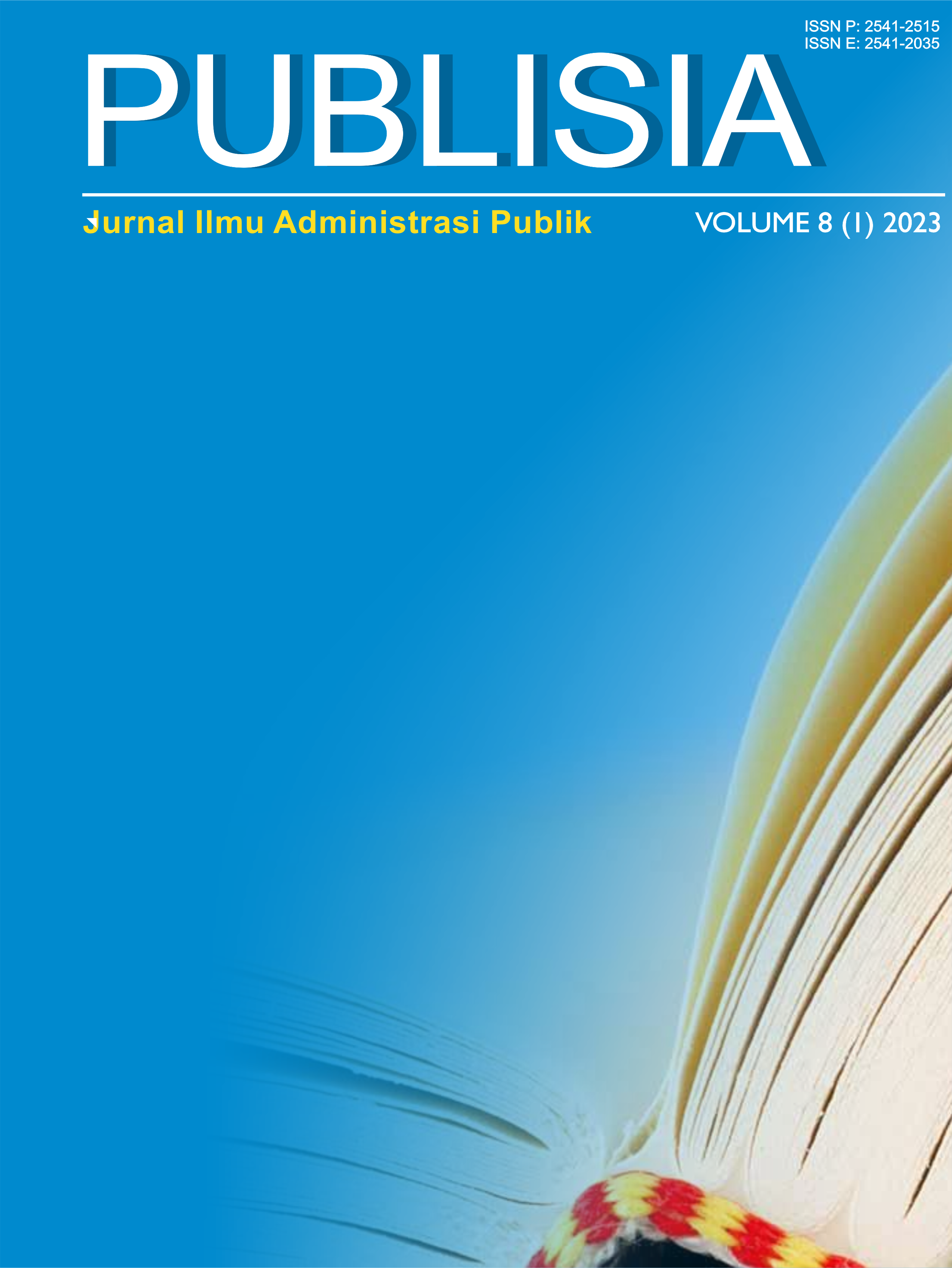Identification of important actions for Musi Rawas Utara Regency to become an agile government
DOI:
https://doi.org/10.26905/pjiap.v8i1.8697Keywords:
Agile governance, COVID-19 pandemic, The era of society 5.0Abstract
This paper aims to provide a formulation related to implementing the AgileGovernance strategies in the management of the Muratara Regency Government during the COVID-19 pandemic towards the Era of Society 5.0. This study uses a qualitative content analysis method. This method emphasizes the analysis, synthesis, and providing recommendations based on a scientific understanding of academic writing. The results of the paper concluded that the implementation of agile governance strategies during the COVID-19 pandemic towards the Era of Society 5.0 in the Muratara Regency Government is: (a) the need to share goals and visions with all members of the organization, seek opportunities and measure the existing options, flexible use of resources, and instructions on strategies that can be implemented. (b). The need for a leader of change who is a catalyst and strengthens the team’s network (c). The needs for organizations that carry out constant learning. (d). The need for implementing an open communication style. (e). The need for a clean organization that follows good governance. (g). The need to develop employee competency (individual).
Downloads
References
Aghina, W., Ahlback, K., Smet, A. de, Lackey, G., Lurie, M., Murarka, M., & Handscomb, C. (2018). The five trademarks of agile organizations.
Azhar, M. (2020). Government strategy in implementing good governance during Covid-19 pandemic in Indonesia. Administrative Law and Governance Journal, 3(2), 300–313.
Bintoro, T. (2001). Good Governance (Paradigma Baru Manajemen Pembangunan). Jakarta.
Bradley, R. v, Pratt, R. M. E., Byrd, T. A., Outlay, C. N., & Wynn Donald E, J. (2012). Enterprise architecture, IT effectiveness and the mediating role of IT alignment in US hospitals. Information Systems Journal, 22(2), 97–127.
Dong, Y., Mo, X., Hu, Y., Qi, X., Jiang, F., Jiang, Z., & Tong, S. (2020). Epidemiology of COVID-19 among children in China. Pediatrics, 145(6).
Gligor, D. M., Holcomb, M. C., & Stank, T. P. (2013). A multidisciplinary approach to supply chain agility: Conceptualization and scale development. Journal of Business Logistics, 34(2), 94–108.
Gunawan, B. (2000). Governance. In Kompas.
Hanida, R. P., Irawan, B., & Rozi, F. (2021). Dynamic governance capabilities in regional budget policy formulation to create agile bureaucracy during COVID-19. Jurnal Manajemen Pelayanan Publik, 5(1), 79–97.
Haslam, S. A., Reicher, S. D., & Platow, M. J. (2020). The new psychology of leadership: Identity, influence, and power. Routledge.
Hormozi, A. M. (2001). Agile manufacturing: the next logical step. Benchmarking: An International Journal, 8(2), 132–143.
Ingraham, P. W., & Romzek, B. S. (1994). New paradigms for government: issues for the changing public service. Jossey-Bass.
Janssen, M., & van der Voort, H. (2020). Agile and adaptive governance in crisis response: Lessons from the COVID-19 pandemic. International Journal of Information Management, 55, 102180.
Juaningsih, I. N., Consuello, Y., Tarmidzi, A., & NurIrfan, D. (2020). Optimalisasi kebijakan pemerintah dalam penanganan Covid-19 terhadap masyarakat Indonesia. SALAM: Jurnal Sosial Dan Budaya Syar-i, 7(6), 509–518.
Kemenkes, R. I. (2020). Pedoman pencegahan dan pengendalian coronavirus disease (covid-19).
Kurniawan, D. I., Maulana, A., & Wicaksono, I. (2021). Agile governance sebagai bentuk transformasi inovasi. In Doctoral Dissertation, Universitas Muhammadiyah Jember (pp. 1–9).
Kusumawati, W., & Kriswibowo, A. (2021). Agile Governance Dinas Kesehatan Kabupaten Tulungagung dalam menangani Covid-19. Journal of Education, Humaniora and Social Sciences (JEHSS), 4(2). https://doi.org/https://doi.org/10.34007/jehss.v4i2.736
Liang, H., Wang, N., Xue, Y., & Ge, S. (2017). Unraveling the alignment paradox: How does business—IT alignment shape organizational agility? Information Systems Research, 28(4), 863–879.
Luna, A. J. H. de O., Kruchten, P., Pedrosa, M. L. G. do E., Neto, H. R., & de Moura, H. P. (2014). State of the art of agile governance: a systematic review. ArXiv Preprint ArXiv:1411.1922.
Narvaez Rojas, C., Alomia Peñafiel, G. A., Loaiza Buitrago, D. F., & Tavera Romero, C. A. (2021). Society 5.0: A Japanese concept for a superintelligent society. Sustainability, 13(12), 6567.
Ramadyah, S., As' ari, H., & Melani, N. L. (2022). Agile Governance in Handling the Covid-19 Pandemic by The Kampar District Health Office in 2021. Publica: Jurnal Pemikiran Administrasi Negara, 14(2), 204–214.
Rohmadin, S., & Wasistiono, S. (2020). Momentum penataan ulang organisasi pemerintah daerah kabupaten/kota pada Era “New Normal.†Jurnal Ilmu Pemerintahan Widya Praja, 46(1), 213–229.
Schwab, K., & Davis, N. (2018). Shaping the future of the fourth industrial revolution. Currency.
Seftia, C. D., & Meiwanda, G. (2022). Agility pelayanan publik pada masa new normal oleh mall pelayanan publik Kota Pekanbaru. JIANA (Jurnal Ilmu Administrasi Negara), 20(1), 37–46.
Setiawan, D., & Lenawati, M. (2020). Peran dan strategi perguruan tinggi dalam menghadapi era Society 5.0. Journal of Computer, Information System, & Technology Management, 3(1), 1–7.
Stern, S., Matthias Daub, Julia Klier, Anna Wiesinger, & Azel Domeyer. (2018). Government 4.0 – The Public Sector in the Digital Age Leading in a Disruptive World. In McKinsey Company.
Suryadharma, S. I. M., Triyani Budyastuti, S. E., & Ak, M. (2019). Sistem Informasi Manajemen. Uwais Inspirasi Indonesia.
Umro, J. (2020). Tantangan guru pendidikan agama Islam dalam menghadapi era society 5.0. Al-Makrifat: Jurnal Kajian Islam, 5(1), 79–95.
Vernanda, R., & Negar, L. A. (2009). Kesiapan indonesia menuju agile governance. Konferensi Nasional Ilmu Administrasi, 1–6.
WHO. (2020). Novel Coronavirus (2019-nCoV) Advice for the Public. https://www.who.int/emergencies/diseases/novel-coronavirus-2019/advice-for-public
Worldometer. (2020). COVID-19 Coronovirus pandemic.
Yuliana, Y. (2020). Corona virus diseases (Covid-19): Sebuah tinjauan literatur. Wellness And Healthy Magazine, 2(1), 187–192.
Downloads
Published
How to Cite
Issue
Section
License
Authors who publish with this journal agree to the following terms:
- Copyright of the published articles will be transferred to the journal as the publisher of the manuscripts. Therefore, the author confirms that the copyright has been managed by the journal.
- Publisher of Publisia: Jurnal Ilmu Administrasi Publik University of Merdeka Malang.
- The copyright follows Creative Commons Attribution and share a like License (CC BY SA): This license allows to Share and copy and redistribute the material in any medium or format, Adaptative remix, transform, and build upon the material, for any purpose, even commercially.







